Corruption has long been a major challenge for past and present governments. Today, bribery has become so ingrained in daily life that it is treated as just another service charge—even for services that should be provided free of cost. The most alarming aspect is not just the prevalence of corruption but how deeply normalized it has become within society.
Visit most government offices, and you’ll likely witness preferential treatment happening right before your eyes. Whether it’s a friend, family member, or relative receiving special favors, someone is always benefiting from these backdoor dealings. Meanwhile, ordinary citizens bear the burden—either enduring months of frustrating delays or reluctantly paying a bribe to expedite the process.
Ethiopia stands at a crossroads. While the nation strives for progress and development, a pervasive shadow of corruption continues to stifle its potential. Consistently ranking low in global corruption perception indices, Ethiopia presents a complex landscape where government institutions, international aid, and the daily lives of its citizens are impacted by illicit practices. Despite the establishment of anti-corruption bodies and the enactment of laws aimed at curbing this menace, the effectiveness of these measures remains a deeply troubling question.
The stark reality is laid bare by Transparency International’s 2024 Corruption Perceptions Index (CPI), which awarded Ethiopia a meager score of 37 out of 100. This places the nation at a disheartening 99th position out of 180 countries, a far cry from the “very clean” public sector represented by a score of 100. While this score marginally surpasses the average of 33 for sub-Saharan African countries, it offers little comfort considering the gravity of the issue. Alarmingly, Ethiopia’s CPI score has stagnated at 37 since the previous year, suggesting that ongoing anti-corruption efforts are yet to yield tangible improvements in public perception. This stability could either indicate a lack of progress or a failure of current measures to resonate with the public.
| Year | CPI Score (0-100) | Global Rank (out of 180) | Sub-Saharan Africa Average Score | Global Average Score |
| 2020 | 30 | 116 | 32 | 44 |
| 2021 | 39 | 87 | 33 | 43 |
| 2022 | 38 | 95 | 32 | 43 |
| 2023 | 37 | 98 | 33 | 43 |
| 2024 | 37 | 99 | 33 | 43 |
Digging deeper, certain sectors emerge as breeding grounds for corruption. Land distribution and administration are particularly notorious, with businesses frequently facing demands for facilitation payments and outright bribes in land-related dealings. This points to deeply ingrained systemic issues within this vital sector. Public procurement is another area riddled with irregularities, including non-transparent tender processes and the questionable awarding of contracts to entities with close ties to the government and the ruling party. Such practices not only squander public funds but also foster an environment ripe for illicit enrichment. The vulnerability of businesses, especially concerning land, underscores the tangible economic repercussions of this corruption.
In response to this challenge, the Ethiopian government has established a multi-layered anti-corruption framework. The Federal Ethics and Anti-Corruption Commission (FEACC) stands as the primary body tasked with combating corruption. Operating under the accountability of the Prime Minister, the FEACC’s mandate encompasses the prevention, investigation, and prosecution of all forms of corruption. Its powers are significant, including the authority to register the assets of government officials and demand asset disclosures from high-ranking individuals. The FEACC’s extensive organizational structure, with directorates covering ethics liaison, asset disclosure, legal advice, and public relations, suggests a comprehensive approach, at least on paper. Further, the FEACC oversees the establishment of Ethics and Anti-corruption Liaison Offices within public institutions, aiming to integrate anti-corruption efforts at all levels.
Adding another layer to the anti-corruption efforts, Prime Minister Abiy Ahmed established a National Anti-Corruption Committee in late 2022, following a cessation of hostilities agreement. This high-level committee, operating at the ministerial level with significant powers, has initiated crackdowns on government officials suspected of corruption. However, the precise division of responsibilities and the coordination between this new committee and existing bodies like the FEACC remain unclear, potentially leading to overlaps or inefficiencies. Concerns have also surfaced regarding the potential for this committee to be used for politically motivated targeting, which could undermine its legitimacy.
Beyond these central bodies, individual ministries are also taking steps. The Ministry of Health, for example, has established an Ethics and Anti-Corruption Executive Office with objectives including enhancing ethical awareness, conducting risk assessments, implementing online asset declaration systems, creating corruption reporting mechanisms, and ensuring whistleblower protection. This sectoral approach signifies a growing recognition of the need to embed anti-corruption measures within the daily operations of government institutions.
Ethiopia has also established a legal framework to criminalize corruption, with the Corruption Crimes Proclamation No. 881/2015 serving as cornerstone legislation. This aligns with the principles of the 2004 Criminal Code. Complementary legislation, Proclamation No. 882/2015, outlines specific procedural rules for corruption cases. The primary institutional framework was initially established by Proclamation No. 433/2005 but has since been revised by Proclamation No. 1236/2021, aiming to enhance ethical values, prevent corruption, foster public participation, build institutional capacity, and ensure transparency through asset declaration. Facilitation payments are explicitly prohibited, and civil servants are barred from accepting gifts that could influence their decisions. Penalties for bribery include imprisonment and significant fines, extending to financial penalties for companies involved in corruption.
However, the effectiveness of these laws and institutions is a subject of ongoing debate. Academic research suggests that while the FEACC plays a role, it has not achieved full effectiveness, potentially due to a mischaracterization of the nature of corruption, such as state capture, requiring different approaches. Concerns about the FEACC being used as a political tool further undermine its impartiality. Factors such as limited institutional autonomy, inadequate resources, and weak cooperation with other stakeholders also constrain its impact. Similarly, the long-term effectiveness of the newly established National Anti-Corruption Committee remains uncertain, with concerns about potential political bias and a lack of clear coordination with existing bodies.
Persistent challenges continue to plague anti-corruption efforts. Legal loopholes and ambiguities can be exploited. Institutional weaknesses, including insufficient resources and expertise within anti-corruption agencies, hinder effective investigations and prosecutions. The inadequate implementation of whistleblower protection and the prevailing fear of retaliation significantly discourage reporting. Despite seemingly strong anti-corruption laws, their impact is undermined by the executive’s significant control over the judiciary and legislature. The perception of partisan application of anti-corruption laws further erodes public trust.
Amidst these challenges, international organizations and NGOs play a vital role. Transparency International provides crucial data through its CPI and operates Advocacy and Legal Advice Centres (ALACs) in Ethiopia, offering confidential legal advice to those seeking to report corruption. The United Nations Office on Drugs and Crime (UNODC) actively supports the Ethiopian government through its National Plan of Action (2019-2021), providing workshops on whistleblower protection and implementing projects like the “Global Action for Business Integrity” to foster public-private collaboration against corruption. Other organizations like the World Customs Organization (WCO) and Good Governance Africa (GGA) also contribute through various programs and advocacy efforts.
Recent corruption cases paint a stark picture of the ongoing crisis. In 2023, USAID took the unprecedented step of halting food aid to Ethiopia for several months following the discovery of a massive corruption scheme involving local officials who manipulated beneficiary lists and diverted substantial amounts of donated wheat. This potentially the largest theft of food aid in history, affecting millions, highlighted the vulnerability of humanitarian assistance to corruption. In 2017, a high-profile case saw 37 individuals, including senior government officials, brought to court for allegedly embezzling approximately 1.1 billion birr involving key state entities. Further, international aid organizations like Norwegian Church Aid have also reported cases of theft and financial irregularities within their operations and with local partners.
Academic research sheds light on the underlying causes of corruption, citing factors such as low payment scales for public officials, lack of ethical leadership, weak supervision, ineffective accountability mechanisms, and the absence of swift punishment. The prevalence of clientelism, kleptocracy, rent-seeking, and state capture further exacerbates the problem. Recruiting and promoting civil servants based on political affiliation rather than merit also fuels corruption. The consequences of corruption are far-reaching, undermining good governance, hindering economic development, impeding social progress, discouraging foreign investment, diverting resources from public services, eroding public trust, and potentially fueling social unrest.
Public perception surveys underscore the deep-seated concern among Ethiopians. A 2023 Afrobarometer survey revealed that nearly two-thirds (64%) believe corruption has increased in the past year. Significant proportions of citizens perceive widespread corruption among civil servants, business executives, and local councillors, highlighting a broad lack of trust in both public and private sector leaders. Alarmingly, almost three-fourths (73%) believe that reporting corruption carries the risk of retaliation. This widespread fear represents a major impediment to effectively combating corruption.
While Ethiopia has established institutions and laws to combat corruption, their effectiveness is significantly hampered by a range of systemic issues, including weak independence, inadequate enforcement, insufficient whistleblower protection, and political interference. The consistent low ranking in the CPI, coupled with numerous recent corruption scandals and a pervasive public perception of increasing corruption and fear of reprisal, paints a concerning picture. Addressing this deep-rooted challenge requires a comprehensive and sustained effort focusing on strengthening institutional independence, ensuring impartial enforcement of laws, robustly protecting whistleblowers, promoting transparency and accountability, and fostering a culture of integrity across all sectors of Ethiopian society. The road ahead is long, but decisive and impartial action is crucial to liberate Ethiopia from the grip of corruption and pave the way for genuine progress and development.






















